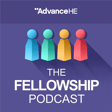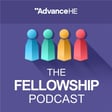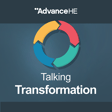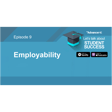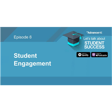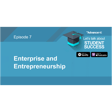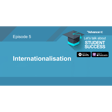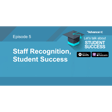Become a Creator today!Start creating today - Share your story with the world!
Start for free
00:00:00
00:00:01

Introduction to Senior Fellowship
This month Louise, Raj and Marita review the key characteristics of Senior Fellowship, including insights into the application process, tips for prospective applicants and the value of Senior Fellowship for your career and professional development.
Transcript
Introduction to Episode 2
00:00:14
Speaker
Hello and welcome to Episode 2 of our Fellowship podcast series. Hello from me, Louise Lumsden. I'm Head of Fellowships Teaching and I'm delighted to be joined by Raj. Hi everyone, I'm Raj Deema, Fellowship and Awards Advisor at Advanced HE. I'm Marita. Hello, I'm Marita Grimwood and I'm Senior Advisor for Teaching Fellowships at Advanced HE. Ah, thank you. Well, as a reminder, you can get involved with our Fellowship podcast series via the hashtag AHE Fellowship pod and please do because we'd really be delighted to hear from you.
Exploring Senior Fellowship in PSF
00:00:50
Speaker
Our first episode to introduce the series focused on fellowship to enhance teaching and supporting learning and we had some good conversations, Raj, Marita and myself. For episode two we're going to explore one of the categories of fellowship and this episode is all about senior fellowship.
00:01:10
Speaker
um Senior Fellow, as you may know, is Descriptor 3 of the Professional Standards Framework that aligns with Advanced HE Recognition as a Senior Fellow. um You can find out more about Descriptor 3 on page 9 of the Professional Standards Framework document, so that's PSF 2023, and that's available and downloadable from the Advanced HE website. So please do look at the PSF to find out more about Descriptor 3 and the requirements for senior fellowship on that document.
Characteristics and Tips for Senior Fellows
00:01:47
Speaker
So for this episode together Rajma Rita and I are going to be reviewing the key characteristics of senior fellowship and offering a few tips which should be helpful particularly if you are thinking about applying for senior fellowship yourself
00:02:03
Speaker
and also will be equally relevant if you act as a mentor to colleagues who are in the process of applying for senior fellowship. um You may be an individual, you may be within an institution, but hopefully there will be some things, some top tips um that you can take away from this episode.
00:02:24
Speaker
So to set the scene about senior fellowship, there's currently over 26,000 individuals who have been awarded a senior fellow. So we're almost at 200,000 fellows and we've got our wonderful year-long festival of fellowship happening this year and more about that at the end. But if you think about it, it's about 13% of all fellows holding senior fellowship.
00:02:53
Speaker
There are two routes to apply for senior fellowship. This can either be through direct application to advanced HE, which we call the direct route, or through an accredited institutional CPD scheme. That's a continuing professional development scheme, and that's what we call accredited route. The majority of our senior fellows are awarded through accredited institutional schemes, but there's still opportunity for individuals to apply direct to advanced HE.
Insights from Writing Retreats
00:03:27
Speaker
Hopefully that sets the scene about senior fellowship and the content of our episode and Raj I just thought if I can come to you first you have an awful lot of experience of working with this category of fellowship. You've been running the senior fellow writing retreats for a number of years very successfully might I add and I wondered if you could introduce senior fellowship
00:03:50
Speaker
and the key characteristics of this category. Thanks Louise and delighted to be really able to have a focus on senior fellowship today and um I can't really talk about senior fellowship without touching a little bit on the history briefly before we talk about currency of senior fellowship but senior fellowship is a category that's really important to the sector and it's really important to learning and teaching and how education And when the previous PSF 2011 was created, the consultation that led to that framework really identified and confirmed the value of taught programs for Descriptor 1 and Descriptor 2 and talked about the value of CPD for teaching and learning practitioners. However, what was missing
00:04:36
Speaker
was a real need, a real gap, a real request for some kind of development and recognition for those who were leading or influencing teaching and learning in higher education as that didn't exist. And so what that consultation led to was a recommendation that the PSF should introduce a criteria and a descriptor that recognises the wider community in higher education and how they are incorporated and recognized for their leadership practice. So Descriptor 3 was born, it was created and it ran for 11 years before the most recent consultation in 21-22.
Understanding Descriptor 3 and Leadership
00:05:16
Speaker
So if we think about that and the huge amount of ah institutions that are now running CPD schemes and this particular category of fellowship where lots of people are really doing fantastic work to lead learning and teaching,
00:05:29
Speaker
We're now settled into a three criteria basis for ah senior fellowship. So if you look at that in a little bit of detail to kind of think about the nature of senior fellowship and the characteristic attributes, we have criterion D31, which is a sustained record of leading or influencing the practice of those who teach and or support high quality learning.
00:05:52
Speaker
So this is really getting to the heart of what senior fellowship is about. It's A, acknowledging that colleagues are engaged in practice that has a direct benefit or influence on what other colleagues are doing in respect of their teaching and learning. A really important clarification in this particular PSF 2023, the correlation between what colleagues are doing how they're influencing others and in turn and how that benefits the wider student experience. The sustained nature is really key here, so this is going beyond direct teaching and learning, it's going beyond one-offs and it really matters in terms of how somebody can identify and acknowledge what they're doing in relation to that sustained practice and that's what these three want really exemplifies.
00:06:37
Speaker
D32 is practice that is effective, inclusive, and integrates all dimensions. So whilst retaining the requirement to address all dimensions of the framework, what's really clear in PSF 2023 is the notion and demonstration of effectiveness, i.e. knowing how that leadership and influence practice works, how it actually is tangible in practice, and how it's made a difference to what these others are doing.
00:07:05
Speaker
And the inclusive nature of that as well, showing that not only practice that is delivered, that he is executed, that is administered and is managed, but actually is meaningful in terms of its engagement by others and for others and demonstrates all dimensions. And we've got a real clarification here as well in terms of that work being demonstrated through R4, the leadership of others practice. So it's not about direct teaching and learning with own students, as important as that work is and as critical as that work is, descriptive three is really about that wider stratosphere of of linking, of influencing, of aligning practice with what others are doing and the dimensions that are demonstrated through that perspective.
00:07:48
Speaker
We then have D33. So D33 is practice that extends significantly beyond direct teaching and or direct support for learning. So I mentioned this briefly earlier, is that the focus here needs to be about what's happening in that space with other colleagues, across PAPs teams, across directorates, perhaps across schools or faculties or services, and what's happening in that space. And where individuals or colleagues might be still working directly with learners,
00:08:18
Speaker
to acknowledge that actually for the importance of Descripta 3, those aspects of practice are not critical or required in an application or for ah any format of Descripta 3 in a and a claim that's being made for senior
Documenting Impactful Practice
00:08:32
Speaker
fellowship.
00:08:33
Speaker
So that's an encapsulation, really a summary of those particular criteria. And in terms of the characteristics, we're really talking about colleagues that have an identity, who have a kind of professionalism that really enables them to show the qualities and attributes. So it's about the skills, the communication, the actions that people take in order to make a difference in what others are doing.
00:08:58
Speaker
um And that acknowledgement of practice is really about demonstrating that and giving those people a chance to demonstrate that practice in a meaningful way, either in an application or through an equivalent appropriate format in ah in a CPD scheme or equivalent. So to start things off, I thought that would be helpful to our line.
00:09:17
Speaker
Yeah it it really is Raj, thank you and ah you know you've talked about the descriptor criteria there's three creek three criteria now and you've explained those and Marita if I could come to you um as we keep referring to page nine of the PSF2023 and hopefully colleagues listening will have downloaded that um but the description at the top the stem statement if you like refers to individuals who can evidence comprehensive understanding an effective practice that provides a basis from which they lead or influence those who teach and or support high quality learning. Raj has explained and the three criteria and talked about that leading and influence. and I'm just wondering, Marita, in the context of Descripta 3, do you have some examples of what this might look like within an application for senior fellowships? Practical examples that you know that we can advise others,
00:10:17
Speaker
Thank you, Louise. Yeah, i think I think the first thing to say is like any category of fellowship is there's a huge range of practice that could be relevant here. So Raj has encapsulated what is distinct about descriptive three. But I'd like to start by emphasising that you could be a senior fellow if you're in a professional services role. So if you're a learning technologist, perhaps working with others to help innovate and adapt to develop their practice.
00:10:46
Speaker
If you're a librarian, you may be supporting staff to embedding and supporting staff to you to embed different approaches to using and citing different sources in their curricula. Those are just two possible examples. You could be in any role that means you are leading or influencing others practice and you absolutely don't have to be teaching students yourself, although you could be and it may be that you are leading because you have you've got a lot of that direct experience of teaching. you certainly have You'll certainly have experience of education which puts you in that position. um Secondly, um I would say if you're if you're thinking more along academic lines in terms of academic roles and the kind of experience that might be relevant,
00:11:41
Speaker
We could be looking at module or program leadership, which involves coordinating or guiding or leading others who are involved in teaching on that module or program. It could be a formal leadership role, maybe in a school or department or faculty. Perhaps you've got responsibility for undergraduate or postgraduate studies. You could be mentoring colleagues in relation to their learning and teaching.
Influence on Practice and Student Impact
00:12:10
Speaker
You could be in involved in staff development, so peer observation schemes. you know you could be running You could be running peer observation schemes um or a projects to engage colleagues with aspects of learning and teaching departmentally or more widely. um So those are you know this just some examples. And I think it's also worth saying that the word senior is in here, but As ever, we're talking about categories of fellowship. So it doesn't mean that you need to be in a role that is considered to be senior. Thank you, Marita. It's building on the experience and it's building on those opportunities and it's logging, it's monitoring those experiences. And then as the description of the descriptor says, it's about the um using that as a basis. So it's that comprehensive understanding and using as a ah basis in which you're
00:13:06
Speaker
you lead and or influence the practice of others but it's really important that we also think about the sustained nature of this category and When you know you look at the applicant guidance, we've got this three to five years. And that in it ensures that applicants are able to use that experience and monitor the impact that they're having. And but you know we'll come onto that um shortly. But it's really important to think about the opportunities, isn't it, that you might have that present themselves to be able to start gathering that evidence.
00:13:42
Speaker
just Just thinking about good examples, Marita, if you were thinking of a senior fellowship application, how do you identify what practical tips could you offer a prospective applicant in terms of you know the examples? I think the question but is should that um applicants should be asking themselves is how they know they've made a difference to others' practice.
00:14:11
Speaker
and If they can explore what the answers are to that question, then that should guide them to the whichever areas of work are going to help them to make their claim. So if I was making a D3 application or indeed if I was mentoring someone, I think this is what I'd be looking at first and I'd be encouraging my mentees to go and talk to people.
00:14:36
Speaker
they've influenced to work out what the evidence might be of the impact that they've had and what what changes have occurred in student learning. Thank you, Marita. I think that's a really useful starting point and I know we're going to come to Raj for some top tips in a moment but I just wondered if it's an opportunity for you to talk about the senior fellow support program that we offer Yes, that's a really
Guidance Program for Applicants
00:15:05
Speaker
good point. We set these ah we set these up um fairly recently within the last couple of years really to address um an unmet need for people who maybe don't have access to institutional support with senior fellowship or will benefit from a bit more support than they have access to. And it's a program that's structured over 12 weeks which gives access to expert guidance
00:15:32
Speaker
a community of peers also applying for senior fellowship, one-to-one feedback on a draft, and I think really importantly, a structure and the opportunity for for a deadline, if you like, that we don't have a rigid deadline for submission, but it allows you to structure your time. And I think this is reflected in our really encouraging first-time success rates for those submitting applications, which is almost I think we're almost 100% not quite. There's always that there's always something that that there's so much variation.
00:16:10
Speaker
Thank you, Marita. Raj, if I could just come to you in terms of um your writing retreats and I don't know if you want to just perhaps talk about the tips that you offer for success as as part of that and how you guide and support um those who come on to the writing retreat. Yeah, thanks Louise, happy to do this and and hopefully um you know This would be beneficial to anyone who's thinking about senior fellowship or supporting others. Marietta has already touched on lots of helpful things in terms of ah the descriptor and the requirements and the STEM and what that might look like and the key fundamental question of how you know but what you do makes a difference to others and what they do. but
00:16:58
Speaker
When I work with applicants, and I think I must have seen thousands of applications over the time that I've worked in this space, a huge amount. And and one of the the kind of critical as elements is really challenging individuals in this space to articulate and who they are, what they're about and what factors they consider they have made a difference and I think a practical tip here is about ah visual mapping of some sort. So working with applicants either face-to-face or online or otherwise
00:17:32
Speaker
getting applicants to create a visual mind map using either a platform or a system or two or just good old-fashioned pen and on paper to get them to identify their links in terms of stakeholders, in terms of audience, in terms of reach, interning externally to their working context and using that to very quickly create, if you like, a profile of their examples of potential work that could be then expanded on and further developed an application. At that point, you can be quite freeform. You can be quite flexible. You can be quite fluid because you're not tied down to the application at that point or the specific format that you're required to do. And it's really important because a staging of this process is about deciding what examples to include and what not to include. And of course, you can't include everything that you've done.
00:18:19
Speaker
If you've done a career of 20 years, of 25 years, of 30 years, it's not going to be possible to include everything. And so selection and filtering is really, really important. And then turning that visualization into some kind of planning grid or planning map, there's one already provided in the applicant guidance for a direct applicants. Institutions may well have their own um resources and materials to guide and help you know applicants to map. And to use that then to identify key examples to to write about what's the evidence in more detail or to to to articulate if you're doing a dialogue or equivalent and document those and that should in turn as well also help to identify which ones will be featured for example if there's a case study format required or which ones will be highlighted in terms of significance for those particular aspects of the descriptive three requirements so you give yourself the best opportunity to a select the appropriate examples but then b articulate them in the appropriate depth and
00:19:16
Speaker
and ah detail needed in order to show the effectiveness and the approach etc and the consideration of of everything that's involved in that. I think another tip really is to think about the evidence base so whatever formats being approached for senior fellowship the evidence base to understand the reasoning for the approach is taken to the leadership or to the decision making is really really important And that could be through scholarship, it could be through research, it could be through discipline, knowledge or literature, it could be policy, it could be guidance. Wherever the evidence base is, it's up to individuals, up to applicants and those who are supporting to really harness and maximise those aspects of evidence, to integrate those in how they've been used, how they've been manifested, how they've been and made useful for individuals in demonstrating their impact.
00:20:10
Speaker
And linked to that as well. I think we really need to think about measures of success measures of effectiveness measures of impact. And we've touched on this briefly but we've got some examples in our applicant gardens, for example, but I would guide individuals to think about things like data and metrics, peer review, peer
Individual Contributions to Leadership
00:20:30
Speaker
feedback, mentee feedback, external feedback, those indicators to show changes to practice, be that progressive in nature or be that wholly conclusive, and both of those are just as valid and student feedback is also valid as well in terms of the wider experience.
00:20:47
Speaker
Another tip I'd also give is to really centralise the self. So many applications that I've seen um either don't centralise the application and the individual to show the way that they're leading or influencing learning and teaching and is, if you like, hidden within the collaborative nature of practice. And of course, higher education is collaborative.
00:21:08
Speaker
We work in communities, we work with others in teams, in directorates, in faculties and schools. But for an award to be made, the clarity around the contribution of the leadership or the influence needs to be as transparent as possible. And that means acknowledging what's collaborative, of course, but then recognising and articulating clearly what contribution is being made by the individual.
00:21:31
Speaker
Some practical tips then to really summarize, make time for yourself, put in planning days, build your evidence over time, build your measures of success, think about the action planning and seek advice. You know, if you've got support from institution, ask for it. and Be part of the support mechanisms that are available to you.
00:21:50
Speaker
um think about opportunities to draft review and draft developmental feedback. And one particular example that I will highlight is from a colleague called Gordon Leonard. He's a transnational education partnership manager and he's produced a blog for us on our website from a couple of years ago, but I really took heart and insight into his approach and he's gone into a lot of detail about his path to achieving senior fellowship which he did within his institutional CPD accredited scheme and there were three things that he mentioned. First was to identify and self-assess strengths as well as areas for development and being really transparent you know with the self about what you do well and perhaps what you do don't do as well
00:22:33
Speaker
and identifying what those are. And that provides then a link to a second point, which is around identifying spheres of influence. So this was about the reach of the examples of work and linked to that as well also was an anchoring theme. So what is the anchor that you're using within your leadership and influence that ground you in terms of what you're doing, in terms of your principles, in terms of your approaches?
00:22:57
Speaker
in terms of what you know is going to work and how do you identify that as you articulate your examples. And this also I think helps to personalise the application so it becomes less of how do I meet the criteria in a really a simple way to one which is then authentic, it's genuine, it's linked to the individual nature of practice and is truly owned by the individual because senior fellows represent what the descriptor three is. They are the criteria in their practice and the sooner that can be reached or the point at which that's reached, I think there's a ah tipping point, there's a transition point to enable applicants to take ownership of the criteria and to exemplify that.
00:23:37
Speaker
in not a kind of external extrinsic framework that doesn't relate to them, but actually embodies who they are as a professional and recognises their practice. And the last point that he mentioned was really practical. Get writing early, you know, and take colleagues. I get asked the question quite frequently, how long was it take to write an application for senior fellowship? How long was it a piece of drink? It could take anything from a few months to several years. And I think my record is nine years that I had somebody working on their senior fellowship.
00:24:06
Speaker
But it really is a matter of focusing, prioritising and working with the support that you have available to you in order to get you through a process that will enable recognition at Descriptive 3 to be made. Yeah, I think you've got some useful, helpful information there ah for those listening, Raj. And it's, you know, questions that we often have to answer. Many um individuals are used to writing we,
00:24:36
Speaker
And actually it's learning how to use I, you have to, I did this, you know, it's got to be in the
Professional Values and Evaluation
00:24:41
Speaker
first person. and Sometimes that's quite difficult. And I can't stress enough, the Guide to the PSF 2023 Dimensions document for Senior Fellow, um effective as a basis for effective practice was part of the one of the themes when the PSF 2023 was launched, effective and inclusive practice.
00:25:02
Speaker
and two of the dimensions, professional value V3, about the evidence base as a basis for effective practice that you referred to in terms of that evidence base, Raj, and also thinking about core knowledge K3, that critical evaluation as a basis for effective practice.
00:25:20
Speaker
So those dimensions are really important and the guide to the PSF 23 dimension document is really helpful to guide and support that generation of ideas process so that you can be sure that you are going to evidence those dimensions within your application.
00:25:41
Speaker
um Another thing that you were talking about Raj was the leadership and the sphere and Marita I just wondered um you lead on principal fellowship and I just wondered if you could sort of explain the difference you know between the categories looking at the difference between D2, D3, D4 for example because There are differences and the new PSF 2023 really highlights those
Senior vs Principal Fellowship
00:26:09
Speaker
differences. But just for anyone listening, we're having a focus on D3, Descriptor 3 senior fellowship about influence and leadership on the practice of others. But I thought it might be helpful just to really clarify those aspects. I think that's really helpful because it is misunderstood quite often.
00:26:29
Speaker
um The kind of leadership that people bring to make their claim for D3 is often very impressive, often looking at people who have national reputation. They don't have to, but some of the people who make a good D3 claim are influencing practice. you know they that They're innovators and they are disseminating their practice widely, and they are experts in that particular area of learning and teaching.
00:26:59
Speaker
And I think sometimes people think, well, goodness me, this person is so high profile, they should be they should really be D4. But actually, D4 recognizes a particular kind of leadership. So the key difference is that for senior fellowship, we're looking at staff facing leadership and influence. So through your own expertise in learning and teaching, you are then impacting other people's practice and through that, the learners. So you might be, as we've seen, leading program teams disseminating your innovations um internally or externally. You might be an external examiner who's impacting on provision, or you might be leading in your school or department um area like that. But for principal fellowship, it's much more about contributing to strategies and policies
00:27:57
Speaker
which then have a strategic impact going beyond implementation across an area more widely than your immediate operational area. So you will be influencing those strategies and policies. Those strategies and policies will be influencing others' practices, and that is how you influence learners. So to take one example, if you're mentoring, that's evidence towards senior fellowship.
00:28:26
Speaker
if you have set up a mentoring scheme to meet a particular strategic goal in relation to learning and teaching enhancement, that would be more principal fellowship. does that um Do you think that covers the base there? I think so, but of course our guidance, our applicant guidance, our fellowship category tool supports all of these decisions as to which is the most appropriate category.
00:28:51
Speaker
but definitely senior fellowship is the operational, isn't it? It's about the implementation of all those initiatives, um supporting colleagues, and there's a really helpful little diagram in the applicant guidance, I think you would agree, where we have the individual and how they're supporting and influencing their colleagues' practice and how that is making a difference to their students. And it's about their that's the that's the key here, I think.
00:29:24
Speaker
um I don't know if there's anything else in terms of effectiveness, how we how an applicant for senior fellowship will demonstrate the impact of their effective nurse if either of you have got any final comments that you'd like to draw upon that our listeners will find helpful.
00:29:46
Speaker
particularly if they are developing an application or considering an application, or indeed, if we've got some mentors listening who have got mentees who are in the process of developing an application.
Impact on Student Learning
00:29:59
Speaker
So I think if I could come in there, I think the key the key thing is to be able to answer the question, what has changed in student learning as a result of your impact, your influence on others, and to find indicators in support of that.
00:30:15
Speaker
So whether that's module evaluations or student attainment data or reflections of your own stuff, peer observations, your own observations, whatever they are, but being able to answer that question, what difference does it make to student learning? That's key.
00:30:32
Speaker
Yeah, definitely. Thank you. And I'm happy to to add to that as well as as well as the individual responsibility to take account of the the impact and effectiveness of their work. I think the organisations that they work with, be that high education providers or other learned societies or elsewhere,
00:30:49
Speaker
also have a shared accountability in terms of that ongoing professionalism and staff development that enables individuals within those organisations to collate, to record, to capture, to utilise that evidence base, otherwise there's no point really in doing what we're doing.
00:31:06
Speaker
because we need to be able to see that we've made a difference to whatever change or practice that's been identified in needing improvement or enhancement or change or in some in some cases complete transformation in terms of what needs to happen in teaching and then that can't really be done without the individuals working in tandem with the institution and with the wider infrastructure of how that all operates and and for those bits to connect together. And that can sometimes be messy. I think we need to recognize and acknowledge that it's not always straightforward, things that always work out and are always successful in a kind of linear way. And some things might not be effective. Now, that doesn't mean that those types of experiences are valuable, can't be included. But what is important is that there are lessons learned and that there are measures that are put in place to turn around those
00:31:55
Speaker
issues that may be problematic, whatever scale or level that's being worked at and that actions have been taken. in order to change whatever problems have been identified and that's where really authentic and genuine evidence of practice can come in both from institutional support or organizational support as well as what individuals are doing and as as well there's lots and lots of toolkits there are lots of materials both in terms of what advantage is produced but several other organizations
00:32:25
Speaker
and higher education providers themselves and others elsewhere in terms of discipline or subject or professional service guidance and materials and resources have produced things to evaluate CPD, to review CPD and to use those to your advantage. So if you're not familiar with them find them, use them and build them in as regular aspects of practice to not leave evaluation and impact at the end and saying, oh, it's something we need to head on to actually bring it in ah from the start. And actually that's where the effectiveness, particularly the new dimension K3 comes into play. So I remember speaking to one of our program leaders relatively recently and they said how wonderful the new K3 was in terms of the effectiveness because it enabled them
00:33:05
Speaker
as an institution, as an organisation, right from the very start to build in what the measures of effectiveness and success were going to be and to enable individuals to do that for themselves in relation to senior fellowship as well. So I think when those things work together, and we've got some kind of recipe for success. Thank you for explaining about the tools that are available in terms of evaluation. It's really important to think about critical evaluation as a basis for effective practice as part of one of the forms of core knowledge and I think it's just
00:33:41
Speaker
part as well of the community of that senior fellowship brings. So those who are recognised as senior fellows are often those people who are the implementers of the initiatives, of new approaches, and they might be working in departments and faculties. And I just wondered, Raj, if you just wanted to say a little bit about and building capacity of senior fellows and the importance of that within an institutional context.
00:34:11
Speaker
Yeah, happy to do so. And this really is is a demonstration of how institutions are really grappling with developing and recognizing senior fellowship in organizations. um And there are a number of aspects that can be used to support that. And one of the recent elements of building capacity particularly for example is through bulk fellowship support where an institution can purchase a number of applications for a proportion of their staff and put in supportive systems and processes to help different applicants to to achieve the particular category recognition that they're aspiring for. I think critically for institutions and building that capacity these are the people who are the the kind of engine if you like the drivers for change or
00:34:57
Speaker
In other words, they're change agents for for what's happening in an institution in learning teaching. And achieving that recognition that isn't the end point, it's actually a starting point for another chapter.
00:35:08
Speaker
in what institutions are doing. And that building of capacity to take forward educational change, particularly linked to promotion, to lead other leadership roles, to other wider teaching and learning activities is a vital part of the the wider, if you like, career aspects or development that might exist and linked to promotion and career structures and academic or professional service development or equivalent. And that's still an emerging thing and that we're working collectively together with the sector.
00:35:37
Speaker
And an example that I i saw that recently was from Leti Gomaglia and Rebecca Freeman at the University of Warwick, where they they talk about the value of their accredited CPE scheme, particularly around senior fellowship and how they've built a community of practice with and for their senior fellows in order to build um activities and communities that really drive and take forward.
00:36:02
Speaker
learning and teaching and just to give you a kind of snapshot about the kind of things that they've kind of focused on. One is that it's enabled them to benchmark what they've done for themselves with other institutions and what they're doing internally and externally and it also gives them a sense of currency so being able to evidence influence not only on students of course but also on what other colleagues are doing and their practice and marking that sense of collective collegiality which is valued in things like promotion, in committee or group task membership, in affiliation to wider learning and teaching activities and other things that an organisation might do.
00:36:39
Speaker
And then that has a knock-on effect, I think, in terms of the community of practice. So building on the process which Rebecca talks about in terms of teaching and learning and their leadership role. So on a practical level, being able to articulate and narrate that, underpin applications not only for senior fellowship, but other promotion opportunities, for example.
00:36:59
Speaker
and also used in things like applying for funds or grants in teaching and learning where the evidence from a senior fellowship application is being used for further learning and teaching development practice and projects. So that's just a single example that I've identified, but there'll be a multitude of examples across all sorts of different institutional contexts. um Those with accredited provision at CPD descriptive three or or equivalent as well will also benefit.
00:37:24
Speaker
Thank you Rad, yes I know when I applied for my own Senior Fellow it was just that moment to stand back and just think about what I've been doing, how I've gone about it and you know I think for others who are in that process and we've got a lot of and blogs that from Senior Fellows who have been through the process and I would encourage anybody to look those up because they give you really invaluable insights as to the journey as to the process of how they started. And Marita, we started our conversation with some top tips about how to get started and planning. I don't know if you've got any final thoughts about this category of fellowship and before we start coming to a close. Well, I thought of some top tips and I was thinking partly through the lens of mentoring senior fellowship applications because I've got i've got some experience with that.
00:38:12
Speaker
um The big challenge is often about moving the applicant's thinking away from classroom practice. So this is useful advice if you're applying as well as if you're a mentor. Often people looking at senior fellowship are still absolutely passionate about their students, about what they do in the classroom. And it doesn't always feel natural and obvious to them to focus on their leadership. And it can take time and effort to make that mind shift.
00:38:40
Speaker
And that is one of the huge benefits, actually, to doing a senior fellowship application. People come out of it seeing themselves differently and understanding the extent of their impact. So I would say be prepared to put that at the centre of the yeah of the effort of the work and start thinking early on or encourage people to think early on about their own values or approaches as a leader of learning and teaching.
00:39:07
Speaker
that helps it to be an authentic developmental process rather than becoming something where they feel they're ticking boxes because that can actually lead to being not very successful if if it doesn't feel as though it's genuine. And going with both of those, I would say, gather or encourage the gathering of evidence of impact from an early stage and really use that to identify examples of Yeah, the art of good planning. Thank you, Marita. Well, I think that's a really good note to end on. So thank you so much, Raja and Marita, for sharing those invaluable insights into senior fellowship. There's some really helpful hints within
00:39:50
Speaker
this episode to take away and thank you. um Just as a reminder, if you are considering an application or in the process of developing an application, please, please do download and keep referring to the senior fellowship application got applicant guidance and That's part of the applicant pack and a really fantastic resource. The guide to the PSF 2023 dimensions document for senior fellowship is a must to keep by your side at all times as you're going and and working your way through the process. um I think also the PSF dimensions document, you know, when you need those moments of inspiration, it's really good because it's got some ideas and to support, you know,
00:40:36
Speaker
the words of wisdom from Raj and Marita about ideas and information gathering. I think that will help to support. Yes, I actually do that. um So that will help you along the way. Please also do check out the senior fellowship blogs on the Advance HE website that Raj has just referred to. They're really interesting and just little snapshots of how others prepared and and wrote their application and really, really useful.
00:41:04
Speaker
that It's an excellent way to hear from others how they went about their application, including the structure and the sorts of evidence that they included. So we've come to the end of episode two, which was all about descriptive three senior fellowship. And please do join us next month for our next episode, which is going to focus on how to structure an application for one of the four categories.
00:41:28
Speaker
using the simple reflective model that features in all of our Advance HE applicant guidance. um Please also, I mentioned it at the beginning, don't forget to get involved with our year-long Festival of Fellows and that can be via the hashtag, hashtag festival of fellowship. All that remains for me to say is thank you for listening and many thanks to Raja Marita. So bye everyone. Thanks everyone. Bye.
